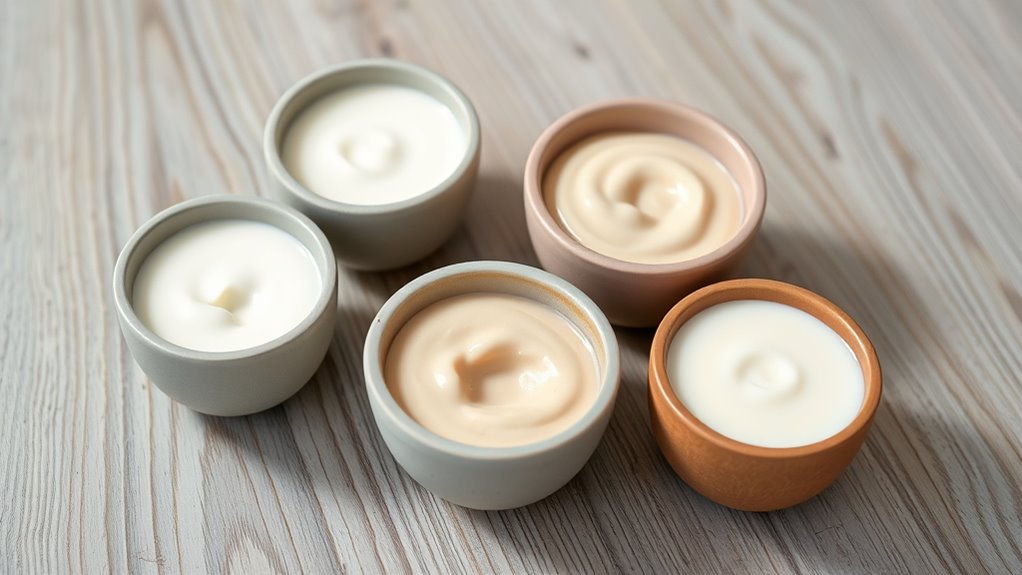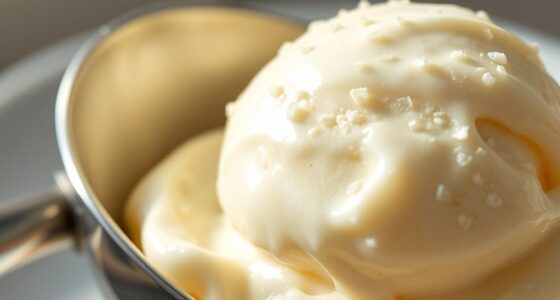When choosing vegan ice cream bases, you’ve got options like coconut milk for a rich, indulgent texture, almond milk for a lighter, nutty flavor, oat milk which offers sweetness and creaminess, and soy milk for a protein-packed, hearty feel. Each type brings unique qualities to your frozen treats, so your choice depends on your taste and dietary needs. Keep exploring to discover how each base can elevate your homemade vegan ice cream experience.
Key Takeaways
- Coconut milk provides a rich, creamy base ideal for indulgent vegan ice cream flavors like chocolate and tropical fruits.
- Almond milk offers a lighter, nutty flavor with lower fat content, suitable for refreshing and subtle ice cream options.
- Oat milk has a naturally sweet, hearty taste with a thick texture, perfect for wholesome, rich frozen desserts.
- Soy milk is high in protein, creating a hearty, creamy consistency that complements bold flavors such as coffee and chocolate.
- Choice of base depends on desired flavor profile, dietary needs, and texture, with all offering smooth, dairy-like ice cream.

Vegan ice cream bases are the foundation for creating delicious, dairy-free frozen treats that satisfy your sweet tooth. When you’re exploring dairy free alternatives, plant based ingredients offer a versatile and rich foundation for your ice cream creations. Whether you prefer the creamy texture of coconut milk or the nutty flavor of almond milk, these bases serve as the starting point for endless flavor combinations and textures. Choosing the right base depends on your taste preferences and dietary needs, but all of them provide a smooth, velvety consistency that mimics traditional dairy ice cream without using any animal products.
Coconut milk is perhaps the most popular choice among vegan ice cream bases because of its natural creaminess and subtle sweetness. Made from the flesh of mature coconuts, it’s thick, rich, and perfect for crafting indulgent frozen desserts. The high fat content in coconut milk lends a luxurious mouthfeel, making it ideal for creating decadent flavors like chocolate, vanilla, or tropical fruit blends. Plus, it’s widely available and pairs well with a variety of mix-ins and flavorings. When you use coconut milk as your base, you’re tapping into a dairy free alternative that’s both flavorful and naturally creamy, making it a favorite among vegan ice cream enthusiasts.
Coconut milk’s natural creaminess and subtle sweetness make it a top choice for indulgent vegan ice creams.
Almond milk offers a lighter, slightly nutty alternative that still provides a good amount of creaminess. Made from ground almonds blended with water, almond milk is lower in fat than coconut milk but still delivers a satisfying texture. Its mild flavor makes it a versatile base that complements a broad spectrum of add-ins, from berries to chocolate chips. If you’re looking for a dairy free alternative that’s less rich but still smooth and tasty, almond milk is a smart choice. It’s also often fortified with nutrients like calcium and vitamin D, making it a nutritious option for your frozen treats.
Oat milk has surged in popularity thanks to its naturally sweet, hearty flavor and creamy consistency. Made from oats soaked and blended with water, oat milk creates a smooth base that’s perfect for dairy free ice creams. Its slightly gluten-like undertone pairs beautifully with flavors like cinnamon, caramel, or apple. Additionally, oat milk tends to produce a thicker, more substantial texture, which can make your ice cream feel more indulgent. It’s an excellent plant based ingredient if you want a dairy free alternative that offers both creaminess and a subtly sweet taste. Furthermore, its compatibility with various flavors makes it a favorite among those seeking a wholesome, rich vegan treat.
Soy milk rounds out the options with its high protein content and neutral flavor. Derived from soybeans, soy milk provides a rich, creamy base that closely resembles traditional dairy ice cream in texture. It’s especially good for those who want a hearty, satisfying treat, as its protein content adds a bit of extra richness. Soy milk’s mild flavor allows it to work well with bold flavors like coffee, chocolate, or vanilla. As a versatile plant based ingredient, it’s often a go-to for making smooth, creamy vegan ice creams that pack a punch in flavor and texture. In addition, the increasing focus on AI in Education and automation highlights the importance of innovative technologies, much like how plant-based milks are evolving through advancements to improve taste and texture.
Frequently Asked Questions
Which Vegan Milk Base Is Best for a Creamy Texture?
You should choose coconut milk for the creamiest texture in your frozen dessert. As a dairy free alternative, it’s rich and thick, giving your ice cream a smooth, indulgent feel. Its high fat content helps achieve that luscious, dairy-like creaminess that many crave in frozen desserts. So, if you want a truly creamy, satisfying vegan ice cream, coconut milk is your best bet for perfect frozen dessert textures.
Can I Mix Different Vegan Milk Bases in One Ice Cream?
Yes, you can mix different vegan milk bases in one ice cream to create unique flavor combinations and texture variations. Combining flavors like coconut and almond can enhance richness, while blending oat and soy milks offers a creamier consistency. Experimenting allows you to customize the taste and texture, making your ice cream more interesting. Just keep in mind that some mixtures may need adjustments in sweeteners or stabilizers for the best results.
Are Homemade Vegan Ice Cream Bases Safer Than Store-Bought?
Ever wondered if homemade vegan ice cream bases are safer than store-bought? You can feel more confident with homemade options because you control the ingredients, avoiding unnecessary preservatives and additives found in store-bought products. While homemade may offer better safety, it requires proper hygiene and storage. Store-bought versions often contain preservatives to extend shelf life, but if you prioritize fresh, natural ingredients, making your own is a smarter, safer choice.
How Long Does Vegan Ice Cream Typically Last in the Freezer?
You can typically store vegan ice cream in the freezer for about 1 to 2 months, depending on the ingredients and storage conditions. To maximize its shelf life, keep it in an airtight container and avoid frequent freezer door openings. Proper freezer storage prevents ice crystals and preserves flavor. For the best taste and texture, try to consume your vegan ice cream within this timeframe.
Do Vegan Bases Affect the Flavor of Added Toppings or Mix-Ins?
Your vegan ice cream base can influence the flavor of toppings or mix-ins, so consider topping flavor compatibility carefully. Coconut bases add a subtle sweetness that pairs well with tropical or fruity toppings, while almond bases offer a nutty flavor that complements chocolate or vanilla. Oat and soy bases tend to have a neutral taste, but they can influence mix-in texture, making them creamier or firmer. Choose your toppings and mix-ins accordingly for the best flavor harmony and texture.
Conclusion
Now that you know the different vegan ice cream bases like coconut, almond, oat, and soy milks, you can get creative and experiment with flavors and textures. Each base offers unique qualities, so why not try blending them for a personalized treat? With so many options, aren’t you excited to craft your perfect dairy-free ice cream at home? Plunge in and enjoy the delicious, cruelty-free frozen delights waiting to be discovered!










